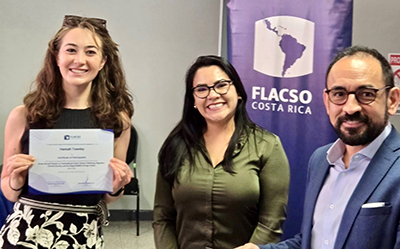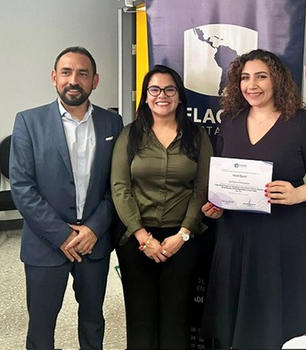
During this year’s spring break in March, 25 George Mason University students, many of them graduate students at the Schar School of Policy and Government, traveled to Costa Rica for an immersive study-abroad program focused on transnational security—tackling complex issues such as human trafficking, migration, environmental crimes, and the illicit drug trade.

Led by international development scholar Camilo Pardo-Herrera, PhD Public Policy ’19, and in partnership with Costa Rica’s Latin American Faculty of Social Sciences (FLACSO) University, a network of social sciences academics founded in 1957 by UNESCO, the program combined academic coursework with real-world exposure to transnational security challenges affecting Latin America and the United States.
The program began in the Costa Rican capital of San José, where students attended sessions analyzing the role of globalization in transnational crime, the economics of illicit markets, and the regional security policies shaping migration patterns. A key theme was the link between organized crime, corruption, and governance, with case studies illustrating how illicit financial flows sustain criminal enterprises.
After traveling to Monteverde, students explored environmental crime and conservation policy, visiting the Monteverde Cloud Forest and Selvatura Park to assess the impact of illegal deforestation and wildlife trafficking. Discussions focused on how environmental degradation fuels security threats, from resource conflicts to displacement. These site visits reinforced classroom discussions on how governments and nongovernment organizations combat illegal environmental activities while balancing economic development.

The journey continued to Arenal, where students examined the relationship between ecotourism and security policies. Through group discussions, they assessed how tourism can be leveraged to prevent illicit activities while promoting sustainable development.
Reflecting on the program, tour leader Pardo-Herrera praised the students’ engagement and enthusiasm.
“Students approached each topic with curiosity and dedication,” he said. “Seeing them connect academic theory with field observations was exciting. This experience not only deepened their understanding of transnational security but also prepared them to think critically about global solutions.”
Morian Bailey, a student in the Schar School’s master of public administration program, highlighted the value of diverse perspectives within the traveling cohort.
“The best part of this study abroad was how culturally diverse my classmates were,” she said. “Everyone had different viewpoints from their respective programs, and it was great to engage with them.”
Kayla Maxey, a senior from George Mason’s School of Integrative Studies, shared that the trip was academically stimulating. “We physically went to see where the things we learned took place,” she said. “I can't wait to apply what I learned to my degree and career.”
With the support of FLACSO Costa Rica, this study-abroad experience provided a unique opportunity for students to analyze security challenges from multiple perspectives. By the end of the course, participants left with a deeper understanding of policy responses to transnational security issues—knowledge that will shape their future academic and professional pursuits.
Author Sarah Bassil is an international securities master’s student at the Schar School of Policy and Government.
Related Stories
- July 7, 2025
- South of the Border, Deep in Policy: Study-Abroad Students Tackle U.S.-Mexico Relations in the FieldJuly 7, 2025
- July 2, 2025
- June 24, 2025
- June 18, 2025
